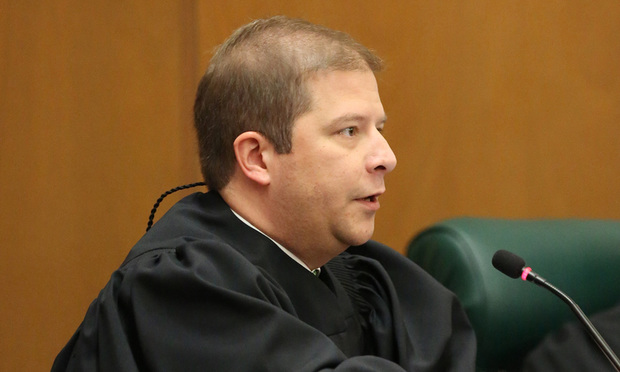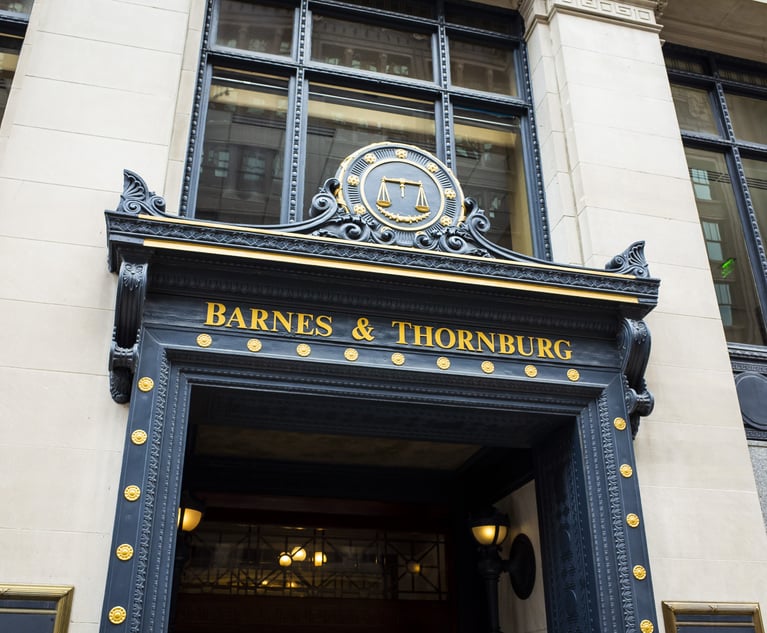High Court Remands Open Records Dispute About Northside Hospital
The Georgia Supreme Court has remanded a case over whether records of Northside Hospital are covered by the state's Open Records Act. The records were sought by a lawyer representing an unidentified client who argued that they are public documents because Northside's facilities are owned by the Fulton County Hospital Authority.
November 02, 2017 at 05:06 PM
5 minute read
 Justice Nels Peterson, Georgia Supreme Court (Photo: Ashley Stolar)
Justice Nels Peterson, Georgia Supreme Court (Photo: Ashley Stolar) A unanimous Georgia Supreme Court on Thursday ruled that a dispute between Northside Hospital and a lawyer seeking its records under the Open Records Act must go back to the trial court that dismissed the case.
The opinion reverses two prior rulings holding that Northside's records were off-limits, even though its main facility is leased from a public entity, the Hospital Authority of Fulton County.
Northside leased its main hospital and assets to the newly formed, private, nonprofit Northside Hospital Inc. in 1999, but the company has since “become massive, with considerable assets in surrounding counties,” wrote Justice Nels Peterson for the court.
Peterson's ruling noted that, while many of Northside's activities have nothing to do with the authority, determining “which of Northside's actions qualify as 'on behalf of' the Authority may be a trickier question” than simply looking at prior cases in which the involvement of public interests meant its records were subject to the act.
“Although the Authority may not be involved in the day-to-day operations of the hospital system it leases to Northside, Northside remains accountable to the Authority,” Peterson wrote.
“How closely the transactions at issue are tied to operating the leased facilities will determine whether documents are 'public records,'” he said.
The court remanded the case to Fulton County Superior Court Judge Gail Tusan “to consider in the first instance whether the records in question are sufficiently connected to the operation of the leased facilities to constitute public records” and, if so, “whether the records may nevertheless be withheld pursuant to a statutory exemption.”
In a concurring opinion, Justice Harold Melton said he wrote to emphasize that the Fulton authority “has so blurred the lines between its public functions and those that it has seemingly delegated to Northside that it cannot be credibly stated that Northside is so completely separated from the Authority that none of the records sought in this case could even possibly be classified as 'public records.'”
The case began in 2015, when Jones Day partner E. Kendrick Smith sued Northside under Georgia's Open Records Act, seeking records relating to Northside's acquisition of four large physician practice groups between 2011 and 2013.
Smith has not revealed who is behind the bid seeking access to the records, but Northside argued that an unidentified competitor—speculated in an appellate brief filed by one of the practices at issue to be Northside rival Emory Healthcare—is hoping to gain a business advantage by accessing the “highly confidential” information.
Smith argued that the records are covered under the ORA because Northside's parent company, although a private entity, is operating under the aegis of a public entity, the Fulton County Hospital Authority.
Northside countered that, in addition to offering a potential business rivals a competitive advantage, disclosure of the records would violate confidentiality agreements hospital and authority officials signed.
Fulton County Superior Court Chief Judge Gail Tusan dismissed the case in 2015 after a three-day bench trial. Last year, in a 5-to-2 decision, the Court of Appeals affirmed Tusan's ruling.
In briefs and oral arguments before the justices in April, Smith's attorney and fellow Jones Day partner Peter Canfield argued that longstanding interpretation of the Open Records Act mandated that, once a public hospital authority cedes control of its facilities to a private entity, the records of the private company become public.
Northside's counsel includes Dentons partners Thurbert Baker, a former Georgia attorney general, and J. Randoph Evans, who was recently nominated as U.S. ambassador to Luxembourg; as well as James Rawls and Derek Bauer, both of Baker Hostetler.
On Thursday, Evans said he was gratified that the justices, like the lower courts, “have finally put to rest any notion that Northside is always subject to the Open Records Act just because it leased its facilities from the authority.”
“The common denominator in all three courts is the outright rejection of that argument, and that it requires an intensive inquiry that should be decided on a case-by-case basis,” Evans said.
Canfield on Friday morning issued this statement: “From day one Northside has claimed it is not subject to the Open Records Act. It sold that bill of goods to the trial court and the Court of Appeals. The Supreme Court has unanimously said no. If Northside wants to claim that records like those we've requested are not subject to the act, it has to prove that the records are not connected with its public mission. We're confident they will not be able to do so.”
Richard T. Griffiths of the Georgia First Amendment Foundation said it was “great news that the justices have followed precedent and held that Northside is fundamentally bound by the principles of open government and transparency.”
Such transparency, Griffiths said, “is the best way to maintain accountability for the taxpayers who paid for Northside and who still effectively own the hospital.”
This content has been archived. It is available through our partners, LexisNexis® and Bloomberg Law.
To view this content, please continue to their sites.
Not a Lexis Subscriber?
Subscribe Now
Not a Bloomberg Law Subscriber?
Subscribe Now
NOT FOR REPRINT
© 2025 ALM Global, LLC, All Rights Reserved. Request academic re-use from www.copyright.com. All other uses, submit a request to [email protected]. For more information visit Asset & Logo Licensing.
You Might Like
View All
Georgia Justices Urged to Revive Malpractice Suit Against Retired Barnes & Thornburg Atty
4 minute read
Medical Student's Error Takes Center Stage in High Court 'Agency' Dispute
7 minute read
Trending Stories
- 1Judge Pauses Deadline for Federal Workers to Accept Trump Resignation Offer
- 2DeepSeek Isn’t Yet Impacting Legal Tech Development. But That Could Soon Change.
- 3'Landmark' New York Commission Set to Study Overburdened, Under-Resourced Family Courts
- 4Wave of Commercial Real Estate Refinance Could Drown Property Owners
- 5Redeveloping Real Estate After Natural Disasters: Challenges, Strategies and Opportunities
Who Got The Work
J. Brugh Lower of Gibbons has entered an appearance for industrial equipment supplier Devco Corporation in a pending trademark infringement lawsuit. The suit, accusing the defendant of selling knock-off Graco products, was filed Dec. 18 in New Jersey District Court by Rivkin Radler on behalf of Graco Inc. and Graco Minnesota. The case, assigned to U.S. District Judge Zahid N. Quraishi, is 3:24-cv-11294, Graco Inc. et al v. Devco Corporation.
Who Got The Work
Rebecca Maller-Stein and Kent A. Yalowitz of Arnold & Porter Kaye Scholer have entered their appearances for Hanaco Venture Capital and its executives, Lior Prosor and David Frankel, in a pending securities lawsuit. The action, filed on Dec. 24 in New York Southern District Court by Zell, Aron & Co. on behalf of Goldeneye Advisors, accuses the defendants of negligently and fraudulently managing the plaintiff's $1 million investment. The case, assigned to U.S. District Judge Vernon S. Broderick, is 1:24-cv-09918, Goldeneye Advisors, LLC v. Hanaco Venture Capital, Ltd. et al.
Who Got The Work
Attorneys from A&O Shearman has stepped in as defense counsel for Toronto-Dominion Bank and other defendants in a pending securities class action. The suit, filed Dec. 11 in New York Southern District Court by Bleichmar Fonti & Auld, accuses the defendants of concealing the bank's 'pervasive' deficiencies in regards to its compliance with the Bank Secrecy Act and the quality of its anti-money laundering controls. The case, assigned to U.S. District Judge Arun Subramanian, is 1:24-cv-09445, Gonzalez v. The Toronto-Dominion Bank et al.
Who Got The Work
Crown Castle International, a Pennsylvania company providing shared communications infrastructure, has turned to Luke D. Wolf of Gordon Rees Scully Mansukhani to fend off a pending breach-of-contract lawsuit. The court action, filed Nov. 25 in Michigan Eastern District Court by Hooper Hathaway PC on behalf of The Town Residences LLC, accuses Crown Castle of failing to transfer approximately $30,000 in utility payments from T-Mobile in breach of a roof-top lease and assignment agreement. The case, assigned to U.S. District Judge Susan K. Declercq, is 2:24-cv-13131, The Town Residences LLC v. T-Mobile US, Inc. et al.
Who Got The Work
Wilfred P. Coronato and Daniel M. Schwartz of McCarter & English have stepped in as defense counsel to Electrolux Home Products Inc. in a pending product liability lawsuit. The court action, filed Nov. 26 in New York Eastern District Court by Poulos Lopiccolo PC and Nagel Rice LLP on behalf of David Stern, alleges that the defendant's refrigerators’ drawers and shelving repeatedly break and fall apart within months after purchase. The case, assigned to U.S. District Judge Joan M. Azrack, is 2:24-cv-08204, Stern v. Electrolux Home Products, Inc.
Featured Firms
Law Offices of Gary Martin Hays & Associates, P.C.
(470) 294-1674
Law Offices of Mark E. Salomone
(857) 444-6468
Smith & Hassler
(713) 739-1250







